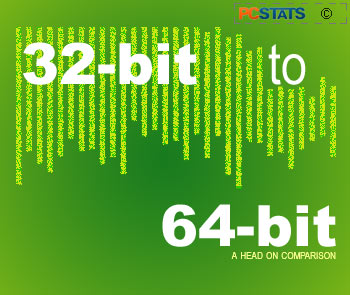AMD Athlon64 - 64-bit vs. 32-bit, A Head On Comparison
The AMD Athlon64 and AthlonFX
line of processors has been on the market long enough to become a standard,
rather than the 'newest thing.' The excellent performance offered by these chips
(running 32-bit benchmarks) has been well documented. PCI-Express support is
coming soon care of the Nvidia nForce 4, and the next wave of chipsets, due around
Christmas should result in a whole lot more 64-bit capable desktops popping
around the world.
Of course, the 64-bit
capabilities of AMD's processors are still more potential than a known quantity. Microsoft has produced
a workable test versions of Windows XP which compatible with the Athlon 64 and
Opteron, but an official release is still a ways off. As far as software goes,
64-bit support is mostly non-existent outside the enterprise business arena,
even in Linux.
A new era of 64-bit computing
is coming though, and it got us to thinking... what does 64-bit, specifically
the 64-bit support built into AMD's Athlon 64 and AthlonFX processors, have to
offer the gamer and enthusiast markets?
 We already know that these processors are great
for games and 32-bit apps (like the Athlon64 4000+), but how does that performance compare to its 64-bit
equivalent? We wanted to find out. So we collected some benchmarks that work
under both 64-bit and 32-bit operating systems, and did some tests…
We already know that these processors are great
for games and 32-bit apps (like the Athlon64 4000+), but how does that performance compare to its 64-bit
equivalent? We wanted to find out. So we collected some benchmarks that work
under both 64-bit and 32-bit operating systems, and did some tests…
In this article PCstats will
examine the performance of the AMD Athlon 64 processor using conventional
Windows XP and 32-bit benchmarking software, and compare those results to the
same tests using the 64-bit 'x64 edition' beta version of Windows XP.
For comparison purposes, we also tested the
performance of the 64-bit XP beta using both 32-bit and 64-bit benchmarking
programs in the 64-bit environment.
These three sets of benchmarks
conform to the AMD Athlon 64 processor's three modes of operation: 'Legacy mode'
(for 32 bit operating systems and apps), 'Compatibility mode' (for 64 bit OS
with 32-bit apps) and '64-bit mode' (true 64-bit OS/applications).
An overview of AMD64 and 64-bit operations
At its heart, 64-bit computing
refers to the capacity of a processor's registers. The registers are small
sections of extremely high-speed memory that a processor uses to store values it
is currently operating on. As an analogy, you could compare them to the hands of
the processor, as they hold objects to be worked on and the results of this
work. Any data that passes to the processor to be operated on must end up in a
register before and after the operation, so the number and design of the
registers is one of the major determining factors in the performance of a
processor.

